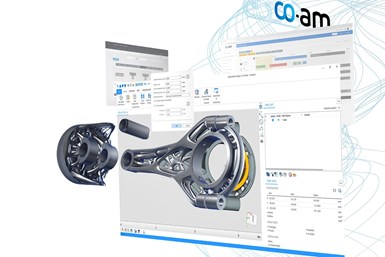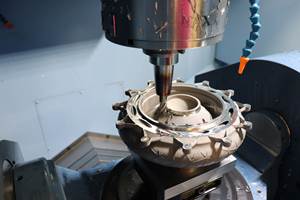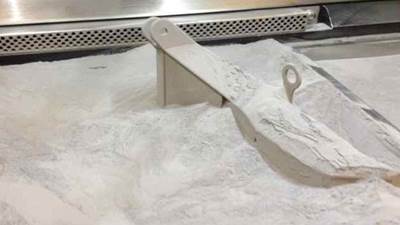Enhanced Magics Software Enables Traceability, Connectivity, Automation
Materialise’s updated Magics workflow automation software helps improve product quality by creating an advanced digital thread connecting the entire manufacturing process.
Materialise, a global provider of 3D printing software and service solutions, has introduced new features to Magics, its data and build preparation software. From product design to part and build preparation to printing, the digital thread connects the entire manufacturing process. The company says that the connectivity and traceability are crucial to facilitate this. That’s why the most recent update of Magics prioritizes connections with other software solutions.
Magics’ integration with CO-AM adds traceability to the 3D printing process with a revision tree that logs every action applied to a part or build, including which user performed it. This connection between data and build preparation software and manufacturing execution systems is critical to track part status from end to end, but is often missing due to silos between software.
“Traceability is critical for any 3D printing production,” says Egwin Bovyn, product line manager at Materialise. “It’s not only a requirement for highly regulated industries like aerospace but also plays an important role in quality improvement. Tracking the parameters of past builds gives users insights into what goes right and what goes wrong. It gives them a detailed log to refer to while improving their processes.”
This update also introduces integration between Magics and Materialise Machine Manager, which connects users to their Build Processors to send project information and parameters necessary to make successful builds.
“By connecting Magics to our Machine Manager, we’re offering a new cloud-based solution to manage your AM machine park and connected Build Processors,” explains Brecht Pellens, product manager at Materialise. “Cloud-based working is inherently more collaboration friendly — users no longer need to rely on one workstation for all their build preparation work — so sharing files and processing parameters with colleagues is also easier than ever. Plus, all processing parameters and build files are now stored in the cloud, continuing the traceability factor in this stage of your workflow.”
Another spotlight feature from the Magics update is Workflow Automation’s first off-the-shelf script. Workflow Automation is a Magics tool that offers ready-to-use and custom scripts — developed by Materialise or the user — to automate repetitive workflows during data and build preparation. The first off-the-shelf script — smart labeling — was created for use by Protolabs and automatically labels parts in minutes. Additional Workflow Automation scripts will be made available later this year.
"Labeling 20 parts takes just one person maybe five minutes with our new automated workflow. Before, it was an hour and a half, two hours for two people. It wasn't fun work,” says Christoph Erhardt, manager of customer projects and additive design at Protolabs. “And now the team experiences less stress and uses their time for more challenging, interesting work that truly motivates them."
- Read how Materialise expanded its CO-AM Platform with seven technology partners to connect and automate all steps of the AM process, including automating design, labeling, machine monitoring and postprocessing.
- Learn about the Materialise acquisition of Identify3D software encryption company in order to add an additional security layer to its CO-AM platform, making it an even more robust and secure software platform for distributed manufacturing.
- Here’s an article offering more details on Materialise’s CO-AM Software for serial additive manufacturing (AM) production, which is designed to give manufacturers cloud-based access to a full range of software tools that enable them to plan, manage and optimize every stage of their AM operations.
Related Content
Two 12-Laser AM Machines at Collins Aerospace: Here Is How They Are Being Used
With this additive manufacturing capacity, one room of the Collins Iowa facility performs the work previously requiring a supply chain. Production yield will nearly double, and lead times will be more than 80% shorter.
Read MoreThis Drone Bird with 3D Printed Parts Mimics a Peregrine Falcon: The Cool Parts Show #66
The Drone Bird Company has developed aircraft that mimic birds of prey to scare off problem birds. The drones feature 3D printed fuselages made by Parts on Demand from ALM materials.
Read MoreVideo: 5" Diameter Navy Artillery Rounds Made Through Robot Directed Energy Deposition (DED) Instead of Forging
Big Metal Additive conceives additive manufacturing production factory making hundreds of Navy projectile housings per day.
Read MoreAdditive Manufacturing Is Subtractive, Too: How CNC Machining Integrates With AM (Includes Video)
For Keselowski Advanced Manufacturing, succeeding with laser powder bed fusion as a production process means developing a machine shop that is responsive to, and moves at the pacing of, metal 3D printing.
Read MoreRead Next
Profilometry-Based Indentation Plastometry (PIP) as an Alternative to Standard Tensile Testing
UK-based Plastometrex offers a benchtop testing device utilizing PIP to quickly and easily analyze the yield strength, tensile strength and uniform elongation of samples and even printed parts. The solution is particularly useful for additive manufacturing.
Read MorePostprocessing Steps and Costs for Metal 3D Printing
When your metal part is done 3D printing, you just pull it out of the machine and start using it, right? Not exactly.
Read More3D Printed Polymer EOAT Increases Safety of Cobots
Contract manufacturer Anubis 3D applies polymer 3D printing processes to manufacture cobot tooling that is lightweight, smooth and safer for human interaction.
Read More





















